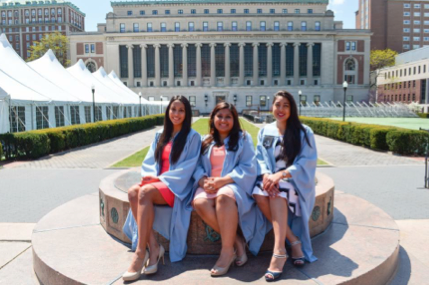
The Founders of SAFA
In the fall semester of 2015, the first ever South Asian Feminism(s) Alliance (SAFA) was introduced to Columbia University. SAFA founders and Barnard alumnae Sarika Kumar, Mallika Walia, and Kaavya Mahajan created the group to unite students on campus to engage in discussions and community action against sexism, misogyny, and patriarchy in the South Asian community.
In spring of 2015, CU Sewa, an on-campus, social justice-oriented group in line with the Sikh tradition Sewa partnered with the Muslim Students Association, the Organization of Pakistani Students, and the Indian Students at Columbia University to coordinate the panel “Transnational Feminism in South Asia: An embodiment of contradictions.” The event featured panelists including Aradhana Sharma, Afiya Zia, and spoken word artists Rupi Kaur and Ramya Ramana. The event received an overwhelmingly positive response which catalyzed recognition of the need for a brave space for South Asian women.
Although SAFA was founded recently, it has already accomplished quite a lot: from discussions and workshops, to films screenings, to collaborations with other social justice oriented groups. They’ve helped organize events including Exploring Identity and Narrative, Overcoming College Transitions: The South Asian Experience, a discussion on South Asian and Black Solidarity. This semester, the group added the facilitation of a “Share Space” — a biweekly supportive space open to all members in the community — to its mission, and has managed to create a space to foster dialogue, engage in conversations that couldn’t necessarily happen openly, and challenge members in the community to think about feminism critically and practically.
It has become clear, however, that the intersection between feminism and South Asian identities is not a simple one. While the reception of SAFA has generally been positive on campus, the pairing of feminism(s) and South Asian identities within the western world has more generally been perceived as contradictory. Through the lens of western feminism, the identity of a South Asian woman has been extrapolated to fit the stereotype of the oppressed, helpless woman who needs saving.
When Western Feminism is applied to South Asian identities (as well as other non-Western identities) the two will obviously clash for so many reasons — but this clash is exactly why intersectional feminism is so important. Feminism cannot be something that is imposed onto other identities, but rather has to be able to adapt and serve unique functions and have different meanings specific to those identities who embrace it.
Mallika admitted to me that while feminism and her South Asian identity are used as lenses for how she moves throughout the world, they do sometimes violently clash. These identities have come at crossroads for her specifically within the spheres of mental health and sexual and domestic violence. Mental health doesn’t really have a place in the South Asian diasporic community, and the “understanding of [it] is absolutely informed by [the] conception of gender, as well as other axes of identity,” Mallika told me. “Anxiety in women is very easily shut down as overreactions or side effects of that ‘time of the month.’ Men are often denied the space and freedom to even express negative emotions at all, lest their masculinity be compromised.”
Moreover, sexual and domestic violence is yet another issue that doesn’t have space in this community. Victim blaming, willful misunderstanding, and even the refusal to understand sexual and domestic violence at all is a “vicious crime that is rooted entirely in disrespect and toxic understandings of power,” according to Mallika, who added, “If the ideals of equality and non-toxic understandings of masculinity and femininity that feminism is rooted in were realized in South Asian culture, we as a community would have a much more forgiving and compassionate response to mental health issues.”
As the daughter of immigrants growing up in a home dominated by sexist thinking, Kaavya internalized what she saw at home. Though she was exposed to feminist literature in high school, she explained to me that she felt disconnected from the discussions within these texts because they “highlighted the experiences of women from privileged backgrounds in narratives that weren’t compatible with daughters of immigrants.” As a result, she embraced the principles of corporate feminism. It wasn’t until she came to Barnard, where she met like-minded students and professors, that she learned the importance of exposing herself to new spaces and ideas. She began to challenge dominant ideologies to gain a deeper “understanding of social justice and cultivate a more inclusive and impactful movement.”
Like Kaavya, Sarika was also initially confronted the ideologies of Western, White feminism before rejecting them because, as she explained, “feminism is tied into he roots of my grandmother’s long silvery hair and to the seven beautiful children my grandparents raised, six of which were girls. It is the connections and disjunctures I feel as a child of immigrants- what I seek to discover from my Punjabi heritage and fight to understand as a South Asian American.”
Dominant, Western feminist ideals ultimately cannot simply be placed on minority identities and be expected to function the same way in their communities. It is for this very reason that having groups like SAFA are so important to these same communities. When I asked the three founders about the purpose and future of SAFA, there was a harmonious unanimity in responses: SAFA gives a space for women in the South Asian diaspora on campus to be heard, they said. It is the space to tackle -isms within the diaspora; to understand how oppression, privilege, identity, and power intersect; to challenge and deconstruct mainstream White feminism. It is a space in which constantly battling dominant narratives and ideologies becomes easier in due to the support, love, and community that is fostered there. This, they believe, is what it ultimately takes to unlearn, deconstruct, and reclaim an intersectional feminism essential for social justice and change.

